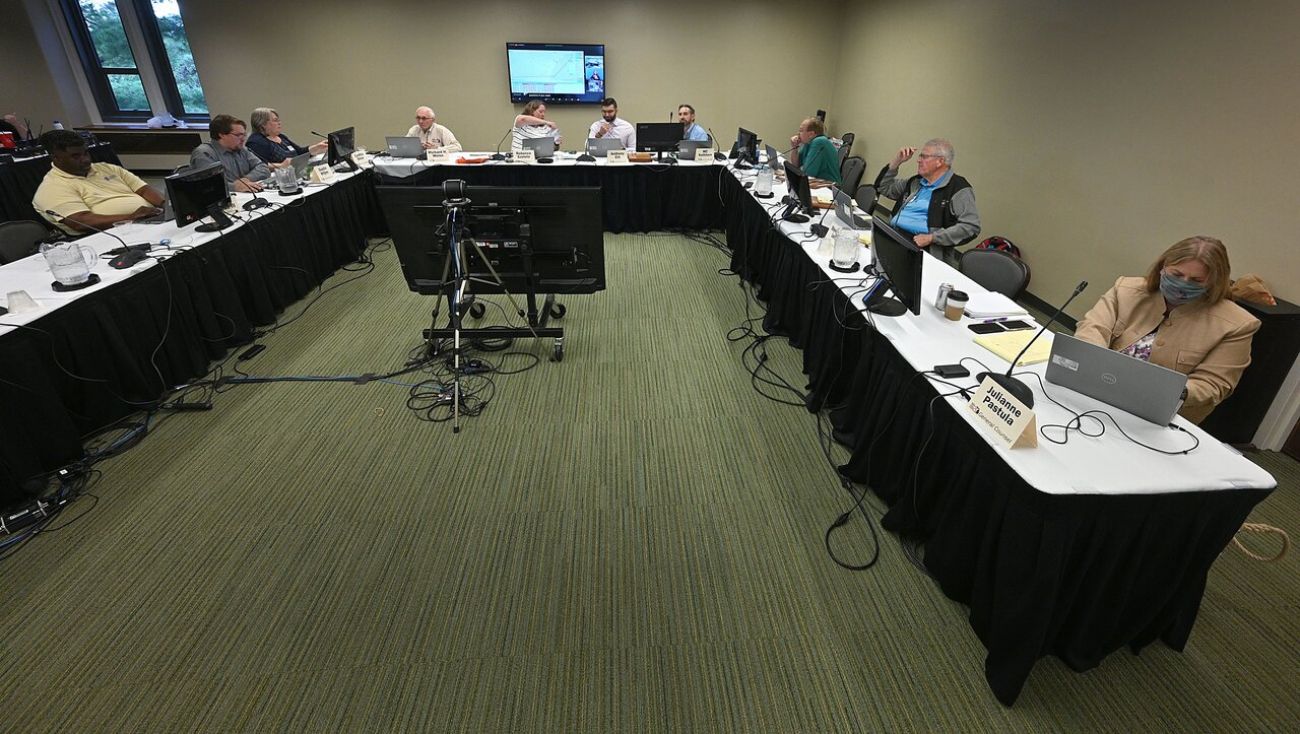Michigan redistricting drafts could make state Senate a toss-up

Nov. 1: Commission approves Senate maps that favor Michigan Democrats
Oct. 28: Michigan redistricting may help Democrats. But will it hurt Black voters?
Oct. 15: Michigan redistricting panel’s maps spark racial backlash, fairness questions
LANSING— The Michigan Senate could become more competitive next year, under three draft district maps approved Monday by the Michigan Independent Citizens Redistricting Commission.
Republicans now control the Senate 20-16 with two vacant seats that favor the GOP.
According to the group’s analysis of the past 13 state elections, two of three maps under consideration would give Democrats a 20-18 edge, while the third draw would result in a 19-19 split.
An analysis from Bridge Michigan, using the 2020 presidential election results, finds that two drafts would give Republicans a slight edge, 20-18.
Related:
- Michigan congressional redistricting drafts are done. Few incumbents are safe
- Michigan redistricting panel’s maps prompt complaints from all sides
- Republicans have edge, but Michigan House drafts include plenty of surprises
Either way, the proposed maps result in a newfound competitiveness of districts that federal judges had called among the most gerrymandered in the nation.
For decades, the party in power at the state legislature drew the legislative and congressional districts — leading to maps significantly favored Republicans. They have controlled the Senate since the early 1980s.
That changed in 2018, when state voters approved a constitutional amendment that created the bipartisan 13-member citizens panel to redraw districts after the decennial census.
The group has been tweaking the drafts for the last few weeks, balancing the protection of minority voters, communities of interest, and federal law.
The maps approved Monday will likely change before a final vote on Dec. 31. The commission is allowing the public to weigh in on the drafts during public hearings in Detroit (Oct. 20), Lansing (Oct. 21), Grand Rapids (Oct. 22), Gaylord (Oct. 25), and Flint (Oct. 26).
The commission has decided to rename the maps using native Michigan trees for the sake of clarity. Bridge Michigan will refer to them as such.
Bridge Michigan analyzed the maps. Here’s what we found:
Elm: A split chamber
Currently, Bay City, Midland and Saginaw are split into three different districts, represented by three Republicans.
But this proposal would group all three cities in one Senate district.
Senate map ‘Elm’
Source: Bridge Michigan analysis of 2020 election data based on maps provided by the Michigan Independent Citizens Redistricting Commission.
According to the commission’s partisan fairness analysis, this map would give each party 19 seats.
However, Bridge Michigan’s analysis of the 2020 election results show that this map could lean Republican, with a 20-18 split. However, two Republican-leaning districts have a margin of less than 1,000 votes.
Cherry: Leans Democrat
Depending on the metric you use, this map could either be a toss up, or benefit Democrats.
Senate map ‘Cherry’
Source: Bridge Michigan analysis of 2020 election data based on maps provided by the Michigan Independent Citizens Redistricting Commission.
According to Bridge Michigan’s analysis, this proposal would give each party 19 Senate seats. However, it has three districts — two Republicans, and one Democratic — where the margin of votes is less than 1,000.
Meanwhile, the commission’s analysis concludes that this map would flip the chamber to majority Democratic, with 20 seats.
Spruce: It depends
This map is an example of how data can provide different results.
The commission used a composite score statewide and federal election results dating to 2012.
Senate map ‘Spruce’
Source: Bridge Michigan analysis of 2020 election data based on maps provided by the Michigan Independent Citizens Redistricting Commission.
Based on that composite score, this proposal would give Democrats a 20-18 majority in the Senate.
However, based solely on the 2020 election results, Democrats would pick two seats but would only have a total of 18 seats, while Republicans would keep control of the upper chamber with 20 seats.
See what new members are saying about why they donated to Bridge Michigan:
- “In order for this information to be accurate and unbiased it must be underwritten by its readers, not by special interests.” - Larry S.
- “Not many other media sources report on the topics Bridge does.” - Susan B.
- “Your journalism is outstanding and rare these days.” - Mark S.
If you want to ensure the future of nonpartisan, nonprofit Michigan journalism, please become a member today. You, too, will be asked why you donated and maybe we'll feature your quote next time!




